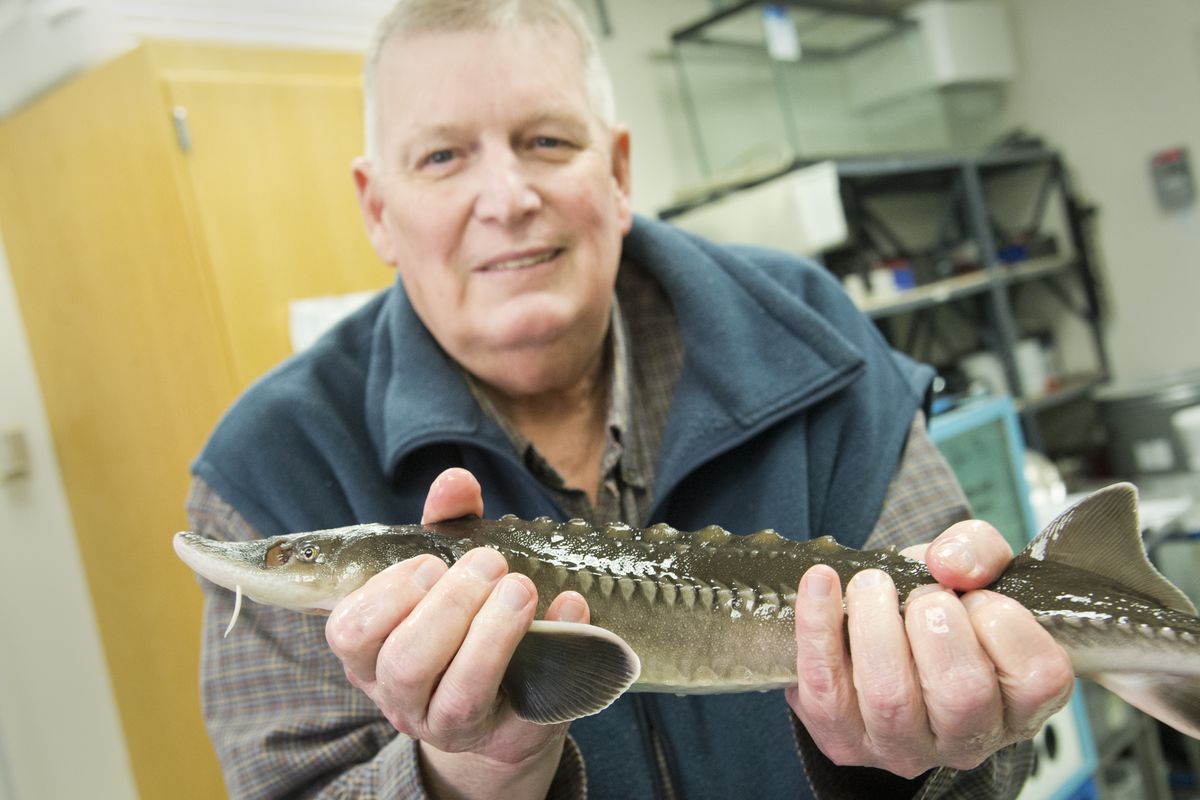Rich Landers: Allan Scholz, champion of region’s fisheries, leaves lasting mark in his wake

No one has influenced so many facets of Inland Northwest fisheries as Allan Scholz during his 35 years at Eastern Washington University.
The 67-year-old biology professor is transitioning into retirement, leaving a legacy that would rival Mark Few if fisheries science were a ball sport featured on ESPN.
Even Gonzaga’s accomplished basketball coach, being a fisherman, has benefitted from Scholz’s work.
“I’m most proud of all the students I’ve trained who are now in the field working,” Scholz said, noting that some cut their teeth in fisheries projects such as curbing the huge goldfish populations in the popular trout and bass fishing waters of Clear and Medical lakes.
He inspired students with his own research and had a primary role in opening the jobs many of them would fill.
Scholz settled in Cheney in 1980, a watershed year for the region’s fisheries. He’d already made a mark in research with a University of Wisconsin team that tracked salmon from Washington’s San Juan Islands, Alaska and Japan.
The work pegged salmon migrations to help manage commercial fishing in the north Pacific. Scholz’s PhD research later centered around salmon navigation.
“We demonstrated that salmon imprint to the odor of the water (in the streams where they hatch) and home back to that water to spawn,” he said.
Scholz was lured to EWU by the opportunities for research in a small university “where the emphasis is on teaching more than just research.”
He enjoyed working with students and he didn’t want to be one of those big-university research professors who supposedly supervises graduate students while never being on campus.
EWU is well-situated to tap basic science from research universities and apply it to solving problems, he said.
Scholz arrived at a pivotal time, just as Congress passed the 1980 Northwest Power Act and established what’s now called the Northwest Power and Conservation Council.
The council works with Bonneville Power Administration and other federal agencies along with utilities, state and local governments, Indian tribes and businesses to plan for power needs.
As a Congressional afterthought, the council also was put in charge of the Columbia River Basin Fish and Wildlife Program adopted in 1982.
The program included the first on-the-water avenue for Native Americans to address the upper Columbia River Basin fisheries that were wiped out by Grand Coulee and other dams. Scholz saw the opportunities.
He jumped into the research funded primarily by the BPA while simultaneously training many of the biologists who would help restore or replace crippled fish runs.
From just a handful of fisheries biologists working in the upper Columbia region at the time, mostly with the Washington Department of Fish and Wildlife, the ranks gradually increased, especially as tribal fisheries programs were established.
“We now have four new tribal fish and wildlife agencies on the Spokane, Coeur d’Alene, Kalispel and Kootenai Indian reservations that EWU had a hand in creating,” he said.
The Colville Tribes have significantly upgraded programs for trout, sturgeon and salmon, including a new chinook hatchery near Chief Joseph Dam. The Kootenai Tribe has just opened a new burbot hatchery to help revive the fishery from setbacks caused by Libby Dam.
“In Northeastern Washington alone there are at least 50 or 60 working fisheries biologists,” he said. “We have a lot more people looking out for these natural resources, and that’s a good thing, especially since the county governments don’t seem to be very aware of environmental problems.”
Tim Peone, one of several Spokane Tribe members who studied with Scholz in the 80s, advanced to manage the Spokane Tribal Hatchery, which produces most of the kokanee for Lake Roosevelt.
Kokanee had flourished in the reservoir after Grand Coulee was completed. The goal was to put fish back in the upper system for people as well as for bears, eagles and other wildlife, Scholz said.
“In 1985 dollars, it would have cost $300-$400 million to install a fish ladder for salmon over Grand Coulee Dam, according to my calculations,” he said. “That wasn’t going to happen. That’s why we focused on kokanee and trout.”
Scholz led studies that paved way for the successful net-pen rearing of rainbows for Roosevelt. The sterile trout are raised and released at a fraction of the cost of rearing them in hatcheries.
“Our early study found that 15-20 percent of the net-pen rainbows were caught by anglers,” he said. “About 5 percent is considered a really good number for hatchery rainbows exploited by anglers in most fisheries.”
The plan for kokanee hasn’t been as successful.
“They were doing okay until the third powerhouse came on line at Grand Coulee and more water was needed for other fisheries,” he said. “Drawdowns went from a maximum of about 30 feet to the range of 40-80 feet. That eliminated kokanee shoreline spawning.”
As Scholz transitions to doing more of his research with a fishing rod, the tribes are shifting emphasis to improving conditions for native redband and bull trout and reviving salmon runs to the upper reaches of the Columbia River system.
The upper basin is where a high percentage of the salmon did their spawning before the dams, and it’s where they will continue to find the colder water they need as global warming increases the Columbia’s water temperature by a 10th of a degree a year.
“Technology is reviving the feasibility of fish passage over Grand Coulee and Chief Joseph dams,” he said. The Whooshh devices – better known as salmon cannons – “might do the job for a fraction of the cost of a fish ladder.”
Scholz has high expectations.
“I’ve trained 48 graduate students,” he said. “Almost all are working for federal, state or tribal agencies, or private consulting firms. I’ve trained about 110 undergraduate students who have gone on and worked for these agencies as well.
“They’re doing great things for fisheries.”
Contact Rich Landers at (509) 459-5508 or email richl@spokesman.com.